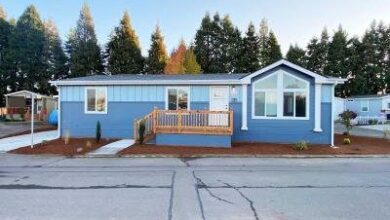Exploring Orlando Homes for Sale: Finding Your Dream Home
Orlando Homes for Sale – Welcome to our comprehensive guide on Orlando homes for sale! If you’re in search of your dream home in this vibrant city, you’ve come to the right place. In this article, we’ll provide you with all the information you need to make an informed decision and find the perfect property in Orlando.
With its sunny weather, diverse neighborhoods, and world-renowned attractions, Orlando offers a unique and exciting place to call home. Whether you’re a first-time buyer or a seasoned investor, navigating the real estate market can be a daunting task. That’s why we’ve created this detailed guide to help you understand the ins and outs of buying a home in Orlando.
Understanding the Orlando Real Estate Market
In this section, we’ll delve into the current state of the Orlando real estate market, including average home prices, market trends, and popular neighborhoods. Understanding the market is crucial for making informed decisions and maximizing your investment. Let’s explore in more detail:
Current Market Conditions
Orlando’s real estate market has experienced steady growth in recent years. The median home price in Orlando is currently around $300,000, with prices varying depending on location, size, and amenities. It’s important to note that the market can fluctuate, so it’s essential to stay updated on the latest trends.
Popular Neighborhoods
Orlando is known for its diverse neighborhoods, each offering a unique atmosphere and amenities. From the bustling downtown area to family-friendly suburbs, there’s something for everyone. Some popular neighborhoods include:
1. Lake Nona: Known for its modern developments and proximity to the airport, Lake Nona is a rapidly growing community with excellent schools and a variety of housing options.
2. Winter Park: With its charming tree-lined streets and historic homes, Winter Park offers a blend of old-world charm and modern amenities. The area is known for its upscale shops, restaurants, and cultural attractions.
3. Dr. Phillips: Situated near the theme parks, Dr. Phillips is a sought-after neighborhood with luxury homes, golf courses, and top-rated schools. It’s a popular choice for families and professionals.
4. Thornton Park: Located near downtown Orlando, Thornton Park is known for its trendy shops, restaurants, and nightlife. The neighborhood offers a mix of historic bungalows and modern condos.
5. Windermere: Nestled among the Butler Chain of Lakes, Windermere is an affluent community known for its luxury estates, waterfront properties, and prestigious golf courses.
Market Trends
Understanding market trends can help you make informed decisions and identify opportunities. In recent years, Orlando has seen an increase in new construction, particularly in the luxury market. Additionally, rental demand remains high due to the city’s growing population and tourism industry.
It’s important to work with a knowledgeable real estate agent who can provide you with up-to-date market information and guide you through the buying process.
Determining Your Budget and Financing Options
Buying a home is a significant financial commitment, and it’s crucial to set a realistic budget before beginning your search. In this section, we’ll explore various financing options available to homebuyers in Orlando and provide tips on how to determine your budget effectively. Let’s dive deeper:
Assessing Your Financial Situation
Before setting a budget, it’s essential to assess your financial situation. Take into account your income, existing debts, and expenses. Consider factors such as down payment, closing costs, and ongoing homeownership expenses like property taxes, insurance, and maintenance.
Pro tip: It’s wise to have an emergency fund set aside for unexpected expenses that may arise after purchasing your home.
Mortgage Options
There are various mortgage options available to homebuyers in Orlando. Some common types include conventional loans, FHA loans, VA loans, and USDA loans. Each option has its own requirements and benefits, so it’s important to research and compare lenders to find the best fit for your needs.
Pro tip: Getting pre-approved for a mortgage can give you a competitive edge when making an offer on a property. It shows sellers that you’re a serious buyer and have the financial means to follow through.
Calculating Affordability
Once you have a clear understanding of your financial situation and mortgage options, you can calculate how much you can afford. Consider your monthly income, debts, and expenses to determine a comfortable monthly mortgage payment. It’s important to leave room in your budget for other essential expenses and savings.
Pro tip: Online mortgage calculators can help you estimate monthly payments based on loan amount, interest rate, and term.
Exploring Orlando’s Diverse Neighborhoods
Orlando is home to a wide range of neighborhoods, each with its own unique charm and amenities. In this section, we’ll provide an in-depth look at some of the most sought-after neighborhoods in Orlando and help you find the perfect fit for your lifestyle. Let’s explore:
Lake Nona
Lake Nona is known for its modern developments, world-class medical facilities, and proximity to Orlando International Airport. The neighborhood offers a variety of housing options, including single-family homes, townhouses, and luxury apartments. With its excellent schools, beautiful parks, and abundance of recreational activities, Lake Nona is a popular choice for families.
Winter Park
Winter Park is a historic neighborhood known for its picturesque tree-lined streets, charming shops, and cultural attractions. The area offers a mix of architectural styles, including historic bungalows, Mediterranean-inspired homes, and modern estates. With its top-rated schools, beautiful parks, and vibrant community, Winter Park is a favorite among families and professionals.
Dr. Phillips
Located near the theme parks, Dr. Phillips is a desirable neighborhood known for its luxury homes, golf courses, and excellent schools. The area offers a mix of single-family homes, townhouses, and condos, catering to a range of budgets. With its proximity to major attractions, dining options, and outdoor activities, Dr. Phillips is an ideal choice for families and professionals seeking a convenient yet upscale lifestyle.
Thornton Park
Thornton Park is a trendy neighborhood located near downtown Orlando. Known for its vibrant nightlife, boutique shops, and diverse dining scene, the area attracts young professionals and those seeking an urban lifestyle. Thornton Park offers a mix of historic bungalows, modern condos, and upscale apartments, providing a range of options for residents.
Windermere
Windermere is an affluent community known for its luxury estates, waterfront properties, and prestigious golf courses. The neighborhood offers a tranquil suburban lifestyle, with access to boating and water sports on the Butler Chain of Lakes. Windermere’s highly-rated schools and family-friendly atmosphere make it a popular choice for families seeking an upscale yet peaceful environment.
Working with a Real Estate Agent
An experienced real estate agent can be your greatest asset when navigating the Orlando housing market. In this section, we’ll discuss the benefits of working with a real estate agent, how to choose the right one, and the role they play in helping you find your dream home. Let’s dive in:
The Benefits of Working with a Real Estate Agent
Working with a real estate agent has several advantages, especially in a competitive market like Orlando. They have access to a wide range of properties, including off-market listings, and can help you find homes that meet your specific criteria. Agents also have in-depth knowledge of the local market, trends, and pricing, allowing them to guide you towards the best investment opportunities.
Pro tip: Real estate agents also handle negotiations, contracts, and paperwork, ensuring a smooth transaction from start to finish.
Choosing the Right Real Estate Agent
When selecting a real estate agent, it’s crucial to find someone who understands your needs, communicates effectively, and has a solid track record. Consider the following factors when choosing an agent:
1. Experience: Look for an agent with experience in the Orlando market and a proven track record of successful transactions.
2. Local Knowledge: An agent who knows the neighborhoods, market trends, and amenities can provide valuable insights and help you make informed decisions.
3. Communication Style: Find an agent who listens to your needs, provides regular updates, and communicates in a manner that suits your preferences.
4. References and Reviews: Ask for references from previous clients and read online reviews to gauge an agent’s reputation and customer satisfaction.
The Role of a Real Estate Agent
A real estate agent plays a crucial role throughout the homebuying process. They’ll help you:
1. Understand your needs and priorities: An agent will conduct an initial consultation to determine your requirements, budget, and desired location.
2. Search for properties:
The Role of a Real Estate Agent (continued)
A real estate agent plays a crucial role throughout the homebuying process. They’ll help you:
1. Understand your needs and priorities: An agent will conduct an initial consultation to determine your requirements, budget, and desired location.
2. Search for properties: Based on your criteria, the agent will search for suitable properties, including both listed and off-market options. They’ll save you time by filtering out properties that don’t meet your requirements.
3. Arrange and accompany property viewings: Your agent will schedule and coordinate property viewings, ensuring that you have access to the homes you’re interested in. They’ll accompany you during these visits, providing insights and answering any questions you may have.
4. Provide market insights and pricing guidance: Real estate agents have access to detailed market data and can provide valuable insights into pricing trends, recent sales, and market conditions. This information will help you make informed decisions and negotiate effectively.
5. Assist with negotiations: Your agent will handle the negotiation process on your behalf, working to get you the best possible price and terms. They’ll use their expertise to navigate counteroffers, inspections, and contingencies.
6. Coordinate inspections and due diligence: Once you’ve found a property you’re interested in, your agent will help coordinate inspections and guide you through the due diligence process. They’ll ensure that all necessary inspections are conducted and assist in evaluating the results.
7. Guide you through the closing process: The closing process involves a lot of paperwork and coordination. Your agent will work closely with the title company, lender, and other parties involved to ensure a smooth and successful closing.
8. Provide post-closing support: Even after the closing, your agent can assist with any post-purchase needs, such as recommending local contractors, connecting you with service providers, or answering any questions that may arise.
By partnering with a knowledgeable and trustworthy real estate agent, you’ll have an advocate on your side who will help navigate the complexities of the Orlando real estate market and guide you towards finding your dream home.
Conducting a Home Search
Once you’ve determined your budget and enlisted the help of a real estate agent, it’s time to start your home search. In this section, we’ll walk you through the process of finding suitable properties, attending open houses, and narrowing down your options. Let’s dive in:
Defining Your Search Criteria
Begin by refining your search criteria. Consider factors such as:
1. Location: Determine which neighborhoods or areas in Orlando align with your preferences and lifestyle.
2. Property Type: Decide whether you’re looking for a single-family home, a condo, a townhouse, or another type of property.
3. Size and Layout: Determine the number of bedrooms and bathrooms you require, as well as any specific layout preferences.
4. Amenities: Consider the amenities that are important to you, such as a pool, a backyard, or a garage.
5. Budget: Keep your budget in mind and ensure that the properties you’re considering fall within your price range.
Utilizing Online Listings and Real Estate Portals
Online listings and real estate portals are excellent resources for finding available properties in Orlando. Websites such as Zillow, Realtor.com, and local MLS databases provide comprehensive listings with detailed property information, photos, and virtual tours.
Pro tip: Save your searches and set up email alerts to receive notifications when new properties that match your criteria become available.
Attending Open Houses and Private Showings
Open houses and private showings allow you to physically explore properties and get a feel for their layout, condition, and surroundings. Your real estate agent can schedule showings for the properties you’re interested in and accompany you to provide insights and answer questions.
Pro tip: Take notes and photos during each showing to help you remember the details of each property.
Narrowing Down Your Options
As you view properties, you’ll start to narrow down your options based on your preferences and priorities. Consider factors such as location, condition, price, and potential for appreciation. Discuss your thoughts and feedback with your real estate agent, who can help you evaluate the pros and cons of each property.
Pro tip: Create a checklist or spreadsheet to compare the features and attributes of different properties, making it easier to make a final decision.
Making an Offer and Negotiating
When you find a home that meets your criteria, it’s time to make an offer. In this section, we’ll guide you through the steps involved in making a compelling offer and provide tips for negotiating to ensure you secure the best possible deal. Let’s dive in:
Understanding the Offer Process
Making an offer involves more than just stating a price. Here’s an overview of the offer process:
1. Determine your offer price: Your real estate agent will assist you in determining a competitive offer price based on market research, comparable sales, and the property’s condition.
2. Consider contingencies: Contingencies are conditions that must be met for the sale to proceed. Common contingencies include financing, home inspection, and appraisal.
3. Review and complete the offer paperwork: Your agent will prepare the necessary documents, including the purchase agreement, and guide you through the process of reviewing and signing them.
Negotiating the Offer
Once you submit your offer, the seller may accept, reject, or counter it. Negotiations may involve multiple rounds of offers and counteroffers as both parties work towards an agreement.
Pro tip: Your real estate agent will serve as your advocate during negotiations, using their knowledge of the market and negotiation strategies to help you secure the best possible terms.
Home Inspections and Due Diligence
Before finalizing the purchase of a home, it’s crucial to conduct thorough inspections and due diligence. In this section, we’ll explain the importance of home inspections, what to look for, and how to ensure you’re making an informed decision. Let’s dive in:
The Importance of Home Inspections
Home inspections are essential for identifying any potential issues or defects in a property. A professional inspector will thoroughly evaluate the property’s structure, systems, and components, providing you with a detailed report of their findings.
Pro tip: Attend the inspection with the inspector to ask questions and gain a better understanding of the property’s condition.
Other Due Diligence Considerations
In addition to a home inspection, you may want to conduct further due diligence, depending on your specific concerns and the property type. Some additional considerations include:
1. Pest inspections: Consider scheduling a separate pest inspection to check for termites, rodents, or other pests that could impact the property’s value and condition.
2. Survey and boundary verification: If necessary, consider obtaining a survey to confirm property boundaries and identify any encroachments or easements.
3. Reviewing HOA documents: If the property is part of a homeowners association (HOA), review the association’s rules, regulations, financial statements, and any pending assessments or litigation.
4. Researching permits and renovations: Check if any renovations or additions have been made to the property and ensure that the necessary permits were obtained.
Pro tip: Your real estate agent and other professionals, such as attorneys or contractors, can provide guidance and recommendations for additional due diligence based on the specific property and your concerns.
Understanding the Closing Process
The closing process is the final step before you officially become the owner of your new home. In this section, we’ll demystify the closing process, explain the paperwork involved, and provide tips on how to navigate this crucial stage smoothly. Let’s dive in:
Reviewing Closing Documents
Prior to the closing, you’ll receive a Closing Disclosure (CD) that outlines the final terms of your loan, including the interest rate, monthly payment, and closing costs. Review this document carefully and compare it to the Loan Estimate you received earlier.
Pro tip: Your lender and real estate agent can answer any questions you have about the CD and other closing documents.
Completing the Final Walk-Through
Prior to closing, it’s customary to conduct a final walk-through of the property to ensure that it’s in the agreed-upon condition. Check that any repairs or agreed-upon changes have been made and that no new issues have arisen since your last visit.
Pro tip: Bring your checklist from previous visits to ensure that everything has been addressed.</
Attending the Closing
The closing is typically conducted at a title company or attorney’s office and involves several important steps:
1. Reviewing and signing documents: You’ll be presented with various documents, including the closing statement, loan documents, and title documents. Take your time to read and understand each document before signing.
2. Paying closing costs: You’ll need to provide the necessary funds to cover closing costs, which may include loan fees, appraisal fees, title insurance, and prepaid taxes or insurance.
3. Transferring funds: If you need to bring funds to closing, you’ll typically provide a certified check or wire transfer to the closing agent. Ensure that you’ve made the necessary arrangements in advance.
4. Recording the deed: Once all documents are signed and funds are exchanged, the closing agent will record the deed with the appropriate county office, officially transferring ownership to you.
Pro tip: It’s a good idea to review the closing documents with your real estate agent or attorney before the closing date to ensure that you understand everything.
Moving to Orlando: Essential Tips and Resources
As you prepare to move to Orlando, there are many factors to consider. In this section, we’ll provide you with essential tips for a seamless relocation, including information on utilities, schools, healthcare, and other resources that will help you settle into your new home. Let’s dive in:
Setting Up Utilities
Prior to your move, contact the utility providers in Orlando to set up your accounts for electricity, water, and gas. Some common utility providers in the area include Duke Energy, Orlando Utilities Commission (OUC), and various water management districts.
Pro tip: Contact the providers well in advance to ensure that your services are active when you move into your new home.
Researching Schools
If you have school-aged children, researching the local school options is essential. Orlando has a variety of public, private, and charter schools to choose from. Consider factors such as school ratings, extracurricular activities, and proximity to your new home.
Pro tip: Reach out to the schools directly to schedule tours and learn more about their academic programs and enrollment processes.
Finding Healthcare Providers
Before you move, research and find healthcare providers in Orlando. Look for primary care physicians, specialists, dentists, and hospitals that meet your needs. Check if your current insurance plan is accepted or explore new insurance options if necessary.
Pro tip: Ask for recommendations from your current healthcare providers or check online reviews to find reputable medical professionals in Orlando.
Exploring Local Amenities
Take some time to familiarize yourself with the amenities and attractions in Orlando. The city is known for its world-class theme parks, such as Walt Disney World, Universal Orlando Resort, and SeaWorld Orlando. Additionally, Orlando offers a vibrant dining scene, shopping malls, recreational parks, and cultural events.
Pro tip: Consider purchasing an annual pass to your favorite theme park to take advantage of special discounts and unlimited visits throughout the year.
Connecting with the Community
Connecting with the local community can help you settle into your new home more easily. Attend neighborhood events, join community groups, or participate in local activities to meet new people and make friends.
Pro tip: Utilize online platforms, such as Meetup or social media groups, to find like-minded individuals and groups in Orlando.
Investing in Orlando Real Estate
If you’re considering investing in Orlando real estate, this section is for you. We’ll explore the benefits of investing in this dynamic market, discuss different investment strategies, and provide insights into the rental market in Orlando. Let’s dive in:
The Benefits of Investing in Orlando Real Estate
Orlando offers several advantages for real estate investors:
1. Strong rental demand: With its growing population and thriving tourism industry, Orlando has a strong rental market. This makes it an attractive option for investors looking for cash flow opportunities.
2. Appreciation potential: Orlando’s real estate market has shown consistent appreciation over the years. Investing in the right neighborhoods and properties can provide long-term appreciation and wealth-building opportunities.
3. Diversification: Real estate can be an excellent way to diversify your investment portfolio, providing stability and a hedge against stock market volatility.
Investment Strategies
When it comes to investing in Orlando real estate, there are various strategies to consider:
1. Buy and hold: Purchase properties with the intention of renting them out for passive income. This strategy benefits from rental income, potential appreciation, and tax advantages.
2. Fix and flip: Purchase distressed properties, renovate them, and sell them for a profit. This strategy requires knowledge of the local market, construction expertise, and effective project management skills.
3. Short-term rentals: With its popularity as a tourist destination, Orlando offers opportunities for short-term vacation rentals. This strategy requires compliance with local regulations and effective marketing to attract guests.
The Rental Market in Orlando
Orlando’s rental market is robust, driven by a combination of residents, students, and tourists. Consider the following factors when investing in rental properties:
1. Location: Choose neighborhoods that offer strong rental demand, good schools, and convenient access to amenities and transportation.
2. Rental rates: Research rental rates in your target area to ensure that your investment property will generate positive cash flow.
3. Property management: If you plan to invest remotely or prefer a hands-off approach, consider hiring a professional property management company to handle tenant screening, rent collection, and property maintenance.
Pro tip: Consult with a local real estate agent or property manager to gain insights into the rental market and identify potential investment opportunities.
Conclusion
In conclusion, finding the perfect home in Orlando requires careful consideration, research, and the assistance of a knowledgeable real estate agent. By understanding the local market, setting a realistic budget, conducting thorough due diligence, and utilizing the resources available to you, you’ll be well-equipped to make a confident decision. We hope this comprehensive guide has provided you with valuable insights and a roadmap to finding your dream home or making a successful investment in Orlando real estate. Happy house hunting!









